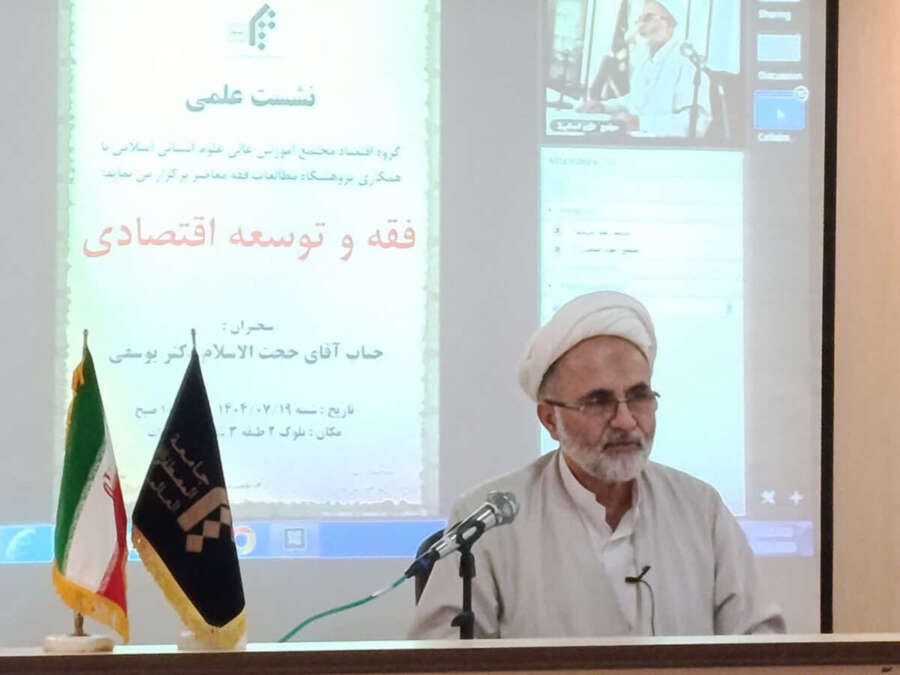Note: According to the news portal of the Research Institute for Contemporary Jurisprudence Studies, the specialized scientific session of the Research Institute for Contemporary Jurisprudence Studies, titled “Jurisprudence and Economic Development,” was held, and Dr. Mohammad Reza Yousefi, associate professor at Mofid University, thoroughly examined the relationship between jurisprudence and economic development. In this session, various perspectives on the challenges and opportunities of the coexistence of jurisprudence and economic development were critiqued and analyzed. Dr. Yousefi, reviewing Dr. Mohsen Renani’s perspective and critiquing his arguments, outlined four main approaches to the interaction between jurisprudence and development, emphasizing that jurisprudence has the capacity to adapt to contemporary needs and cannot simply be considered an obstacle to development. This discussion involves complex jurisprudential, economic, and social dimensions and requires deeper research.
According to the news portal of the Research Institute for Contemporary Jurisprudence Studies, in the 229th specialized scientific session dedicated to the topic of “Jurisprudence and Economic Development,” Hujjat al-Islam wa al-Muslimin Dr. Mohammad Reza Yousefi, associate professor at Mofid University, thoroughly examined the relationship between jurisprudence and economic development and critiqued and analyzed various perspectives in this field.
This scientific session, organized by the Jurisprudence of Economics Group of the Research Institute for Contemporary Jurisprudence Studies in collaboration with the Jurisprudence of Economics Group of the Higher Institute of Humanities affiliated with Jamia Al-Mustafa, saw Dr. Yousefi address the longstanding concern of third-world countries, particularly Muslim societies, regarding developmental backwardness, and critique Dr. Renani’s view on the “incompatibility of jurisprudence with development.”
Dr. Renani had presented two main arguments to support this claim:
- Incompatibility in Terms of Mission: Jurisprudence, as a religious normative system, emphasizes external control of individual and social behavior, while economic development is based on the internalization of norms and individual intrinsic motivations; thus, their missions are in conflict.
- Substantive Difference Between Jurisprudence and Development: Jurisprudence has an individual-centric perspective and its rulings primarily address individual behavior, whereas development has a macro-social perspective, analyzing large-scale economic issues such as inflation, national production, and consumption.
Additionally, Dr. Renani, referring to examples of jurisprudential rulings on usury and alcohol consumption, emphasized that the individual-centric jurisprudential perspective is incompatible with macro-social and economic issues, and the concept of the “fallacy of composition,” which refers to the difference between individual and collective effects of certain behaviors, is another reason for this incompatibility.
In continuation, the associate professor at Mofid University examined four main approaches to the relationship between jurisprudence and development:
- First Approach: The religious intellectual movement, which believes that parts of religion and jurisprudence are incompatible with development, and some rulings need reinterpretation and refinement, though it does not reject the entirety of religion.
- Second Approach: This group believes that the conflict between jurisprudence and development is not real, and based on the experience of East Asian countries like Japan, it is possible to preserve traditional values while achieving development. Thus, Muslims can also have a development model based on Islamic culture and law.
- Third Approach: This perspective holds that development, as a Western concept, is incompatible with authentic indigenous and religious values and culture, and a new, distinct model called the “Islamic Development Model” should be defined.
- Fourth Approach (Institutionalist Perspective): This view holds that religion, culture, and geography do not directly affect development; rather, it is the institutions and rules governing politics and economics that determine development. From this perspective, development can be achieved in both religious and non-religious societies, provided there are open political systems and competitive, non-rent-seeking economies.
Dr. Yousefi also critiqued the points raised by Dr. Renani, emphasizing that:
- History shows that jurisprudence primarily relies on individuals’ intrinsic motivations and is not merely about external obligations; for example, in Islamic societies, intrinsic motivations for paying khums and zakat have existed.
- Economic development in Western countries is also based on strict external laws and controls, such as tax laws and extensive oversight, which are clear examples of external control.
- The process of internalizing motivations, whether positive or negative, is the result of a historical and socially institutionalized process and is not solely related to economic development.
- The examples used to demonstrate the incompatibility of jurisprudence and development are neither precise nor comprehensive, and general conclusions should not be drawn from them.
- Jurisprudence, as a science, has the capacity for reform and evolution, and just as other sciences adapt to new conditions and knowledge, jurisprudence can also evolve in response to contemporary needs.
At the conclusion of the session, Dr. Yousefi expressed appreciation for the audience’s presence, was prepared to answer questions and engage in discussions on this topic, and emphasized that the discussion about the relationship between jurisprudence and development is a complex and multidimensional issue that requires scientific and precise examination within various jurisprudential, economic, and social frameworks.

